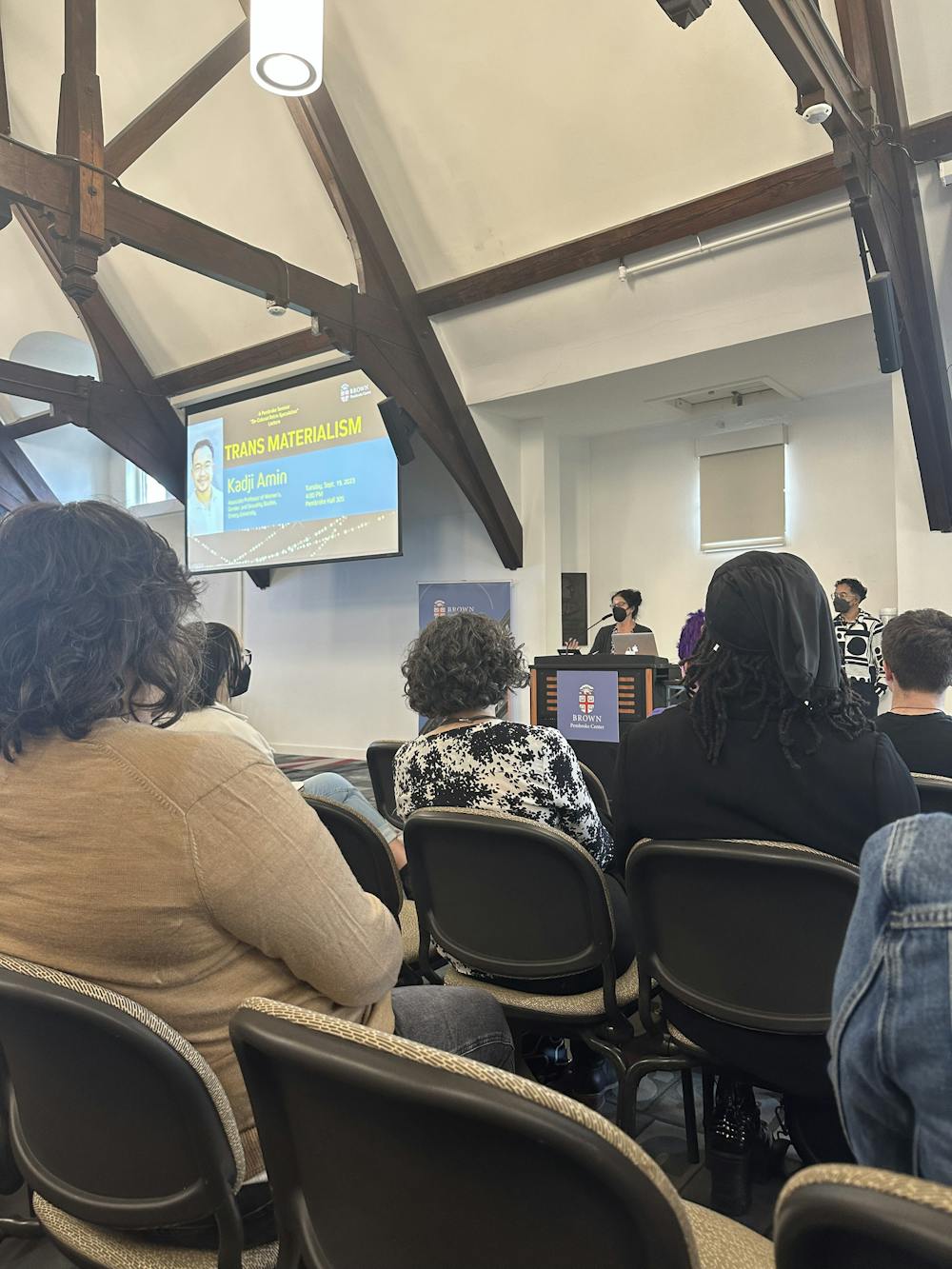Content Warning: This article includes mentions of transphobia and racism.
Students, faculty and community members poured into Pembroke Hall Tuesday evening to listen to Kadji Amin, associate professor of women’s, gender and sexuality studies at Emory University, give a lecture titled “Trans Materialism.”
The lecture explored the history of trans identities before moving to a discussion of “Trans Materialism” — which focuses on the “resources necessary for transition and the practices through which people transition” — such as housing and "access to public space without police harassment," according to the event’s description.
The event was hosted by the Pembroke Center for Teaching and Research on Women's "De-Colonial Retro-Speculation" seminar and was co-sponsored by the center's LGBTQIA+ Thinking Initiative.
Patricia Ybarra, Pembroke seminar leader and professor of theater arts and performance studies, began the event by introducing Amin and his work, which considers “historical, social, theoretical and relational forms of gender, identity and sexuality” while also challenging “sentiment and modes of understanding queerness today, in the past and in the future.”
Amin’s research poses “the possibility of a different reality as a generous invitation to help us imagine otherwise, without abandoning reality for onboard utopianism,” Ybarra added.
Much of Amin’s lecture explored the development of academic and medical awareness of trans identifications. In early 20th-century Berlin, extensive conversations about trans identities occurred within upper-class circles, Amin said, and doctors offered significant pushback against medical transitions for trans people from less privileged socioeconomic backgrounds.
The conversations surrounding trans identities were often exclusionary, Amin said. Socioeconomically privileged people and medical professionals prioritized respectability, “with the explicit and overt aim of preventing trans sex workers from transitioning, and even from being understood … as trans.”
Amin also discussed the process of transitioning during the 1960s and ’70s in the United States. Medical transitions were often exclusionary and dictated by the personal, often racist considerations of the very few doctors who would perform transition surgeries.
One leading doctor in the field at the time, Harry Benjamin, would only perform surgeries on white people who he believed would pass “as heterosexual” after the operation, Amin said.
Because medically transitioning was until recently a universal requirement for obtaining accurate government identification — and because of discrimination from employers — many trans people of color who appeared gender-non-conforming had to earn money by participating in illicit underground economies.
Many found their next pay from prostitution and drug dealing, subjecting themselves to potential violence from clients, aggressors and police intervention just to make a living, Amin said.
With this context in mind, Amin argued in favor of re-centering conversations about transness in a way that promotes the inclusion and well-being of non-white trans community members and prioritizes improving material conditions for trans people over progress in a theoretical realm.
“This means putting Black trans sex workers at the center of trans politics — not symbolically as icons, and not even via tokenism by elevating the leadership positions,” Amin said. He argued for “a political program … that materially improves their lives without demanding respectability.”
“Instead of aspiring to a universalist utopia without (gender) or a liberal utopia in which gender is only individually declared,” Amin advocated for “putting the decriminalization of sex work, prison abolition, economic justice and HIV/AIDS on the top of the trans political agenda.”
Tarika Sankar, digital humanities librarian at the University, thought Amin’s lecture was both “accessible” and “provocative.”
“He’s pushing back against a lot of these core concepts around gender identity that I think a lot of us … aren’t willing to interrogate,” she said. “There's a little bit of a call-out to some other trans studies scholars around gender abolition (and) how we shouldn't really be centering that, but (instead) we should be centering the material realities of the most vulnerable trans people.”
Correction: A previous version of this article incorrectly stated the talk's host organization. The Herald regrets the error.

Ryan Doherty is a section editor covering faculty, higher education and science and research. He is a junior concentrating in Chemistry and Economics who likes to partially complete crosswords in his free time.





